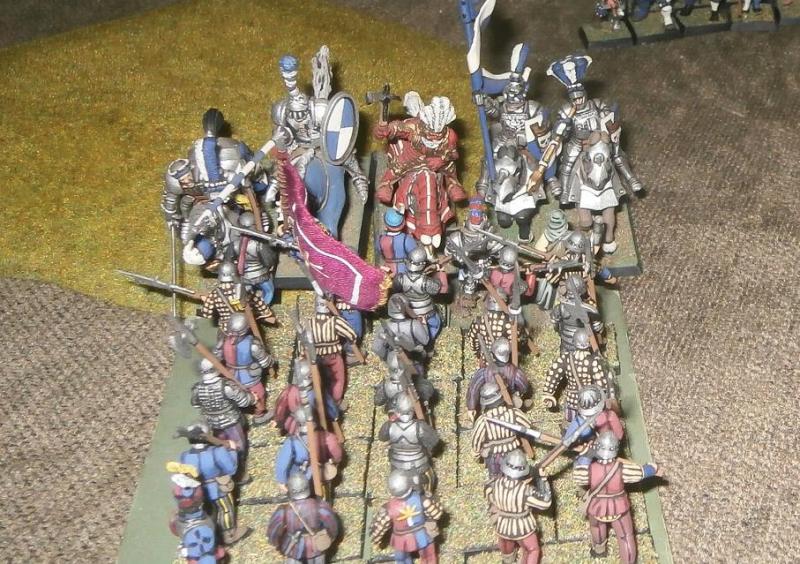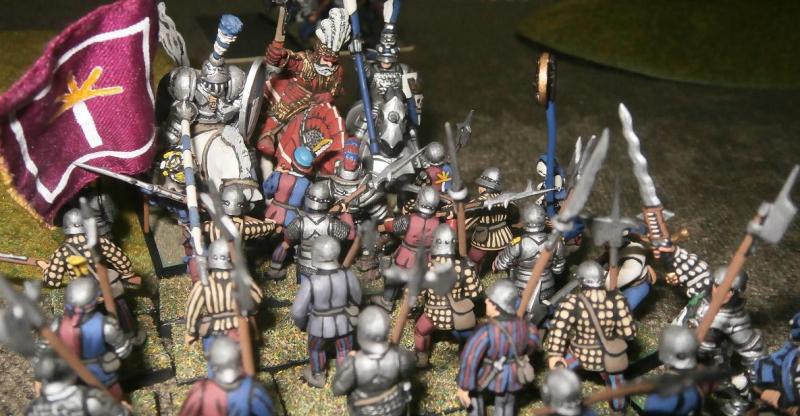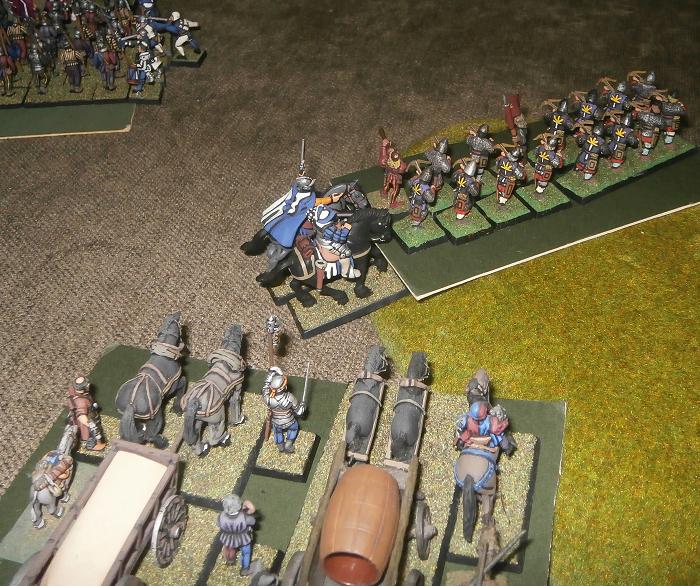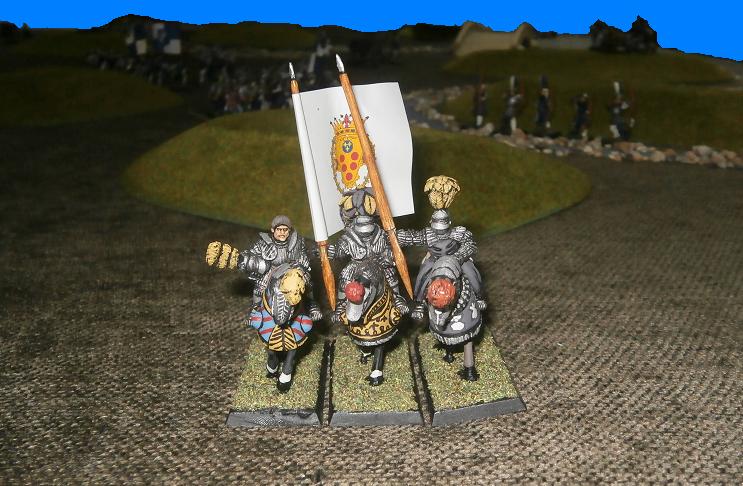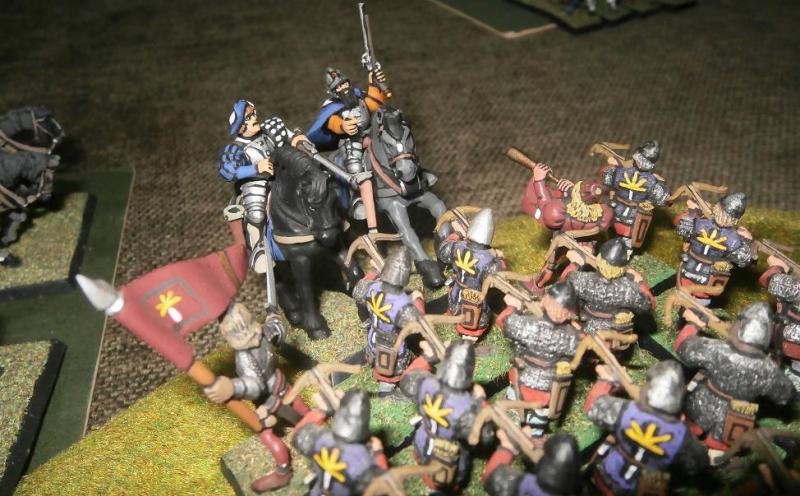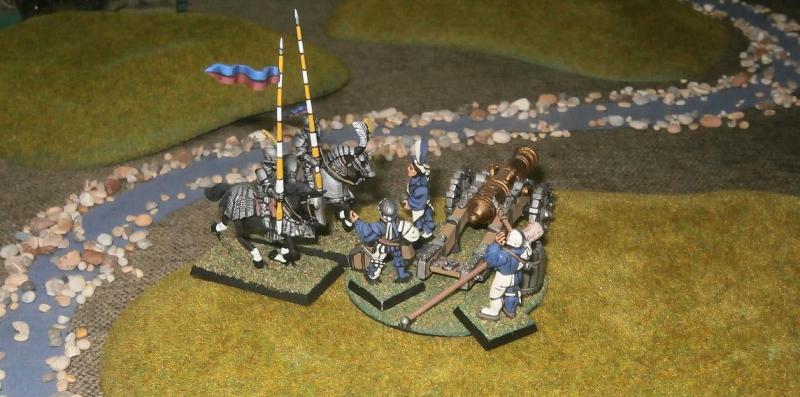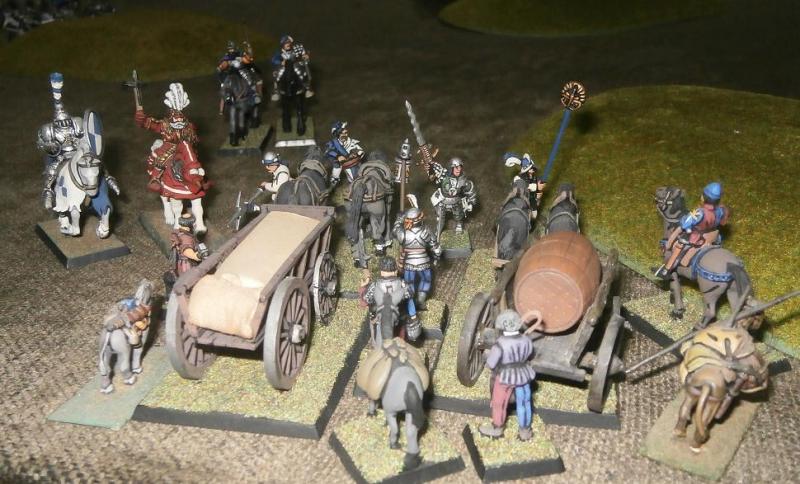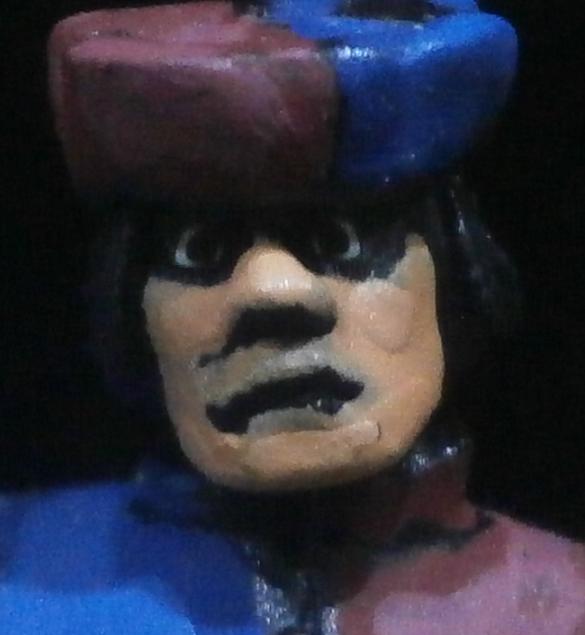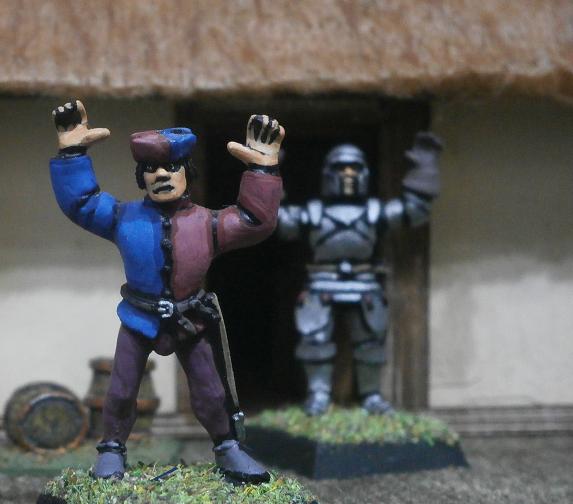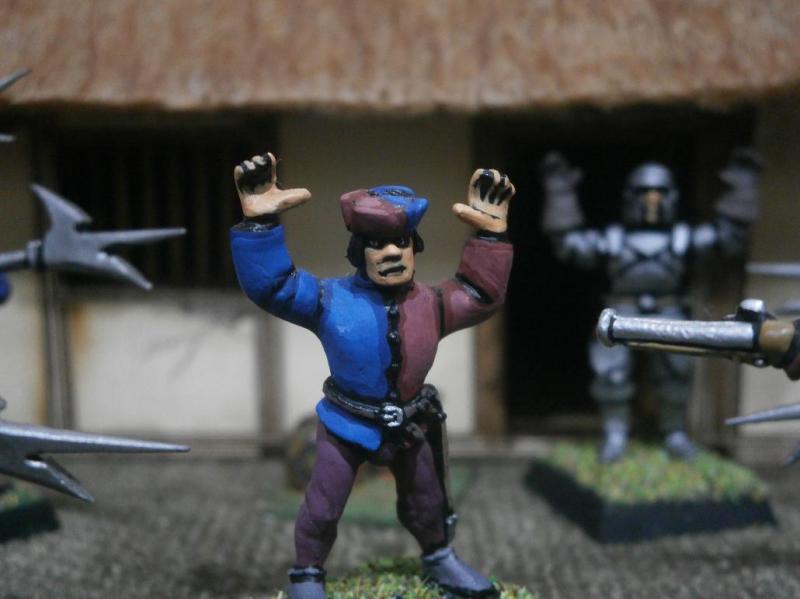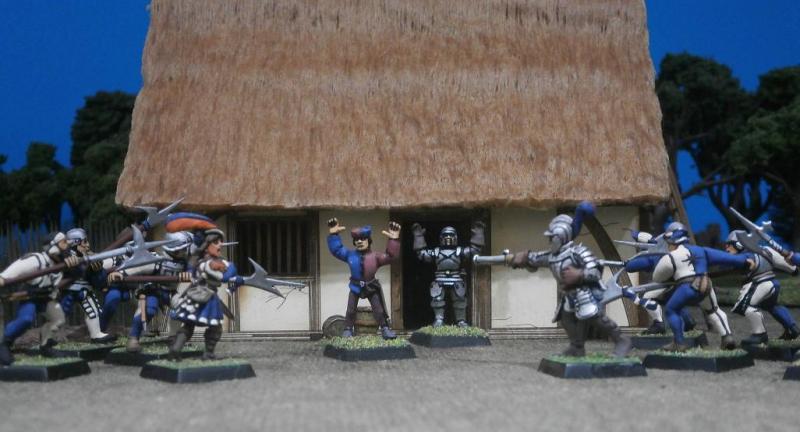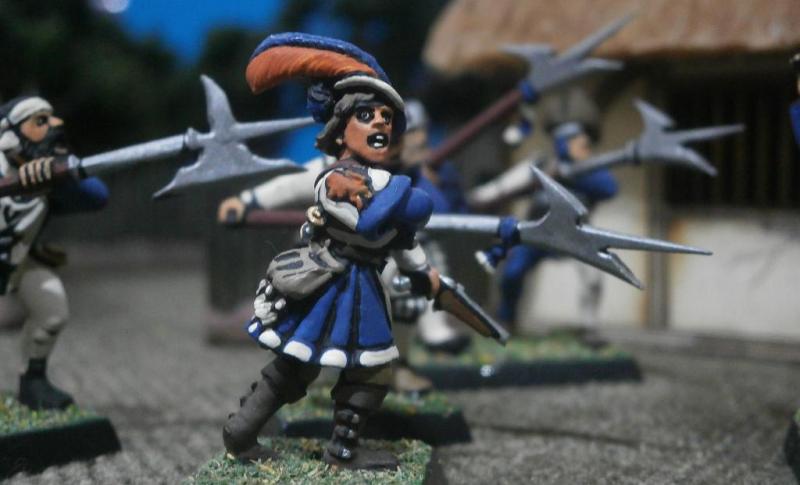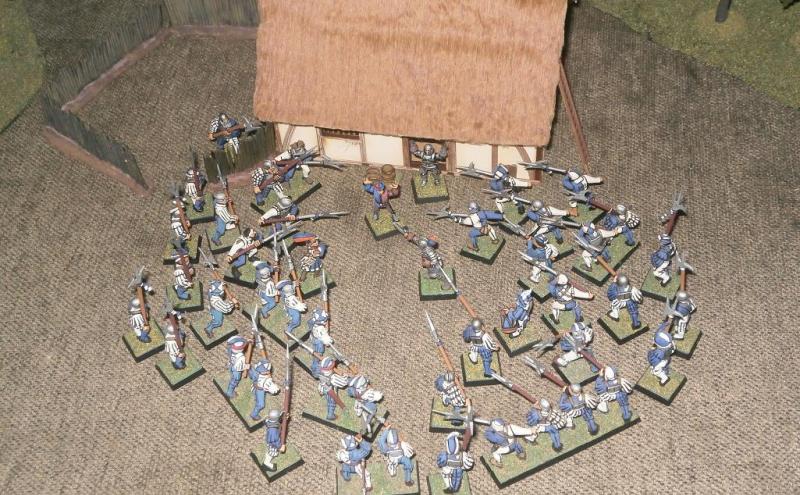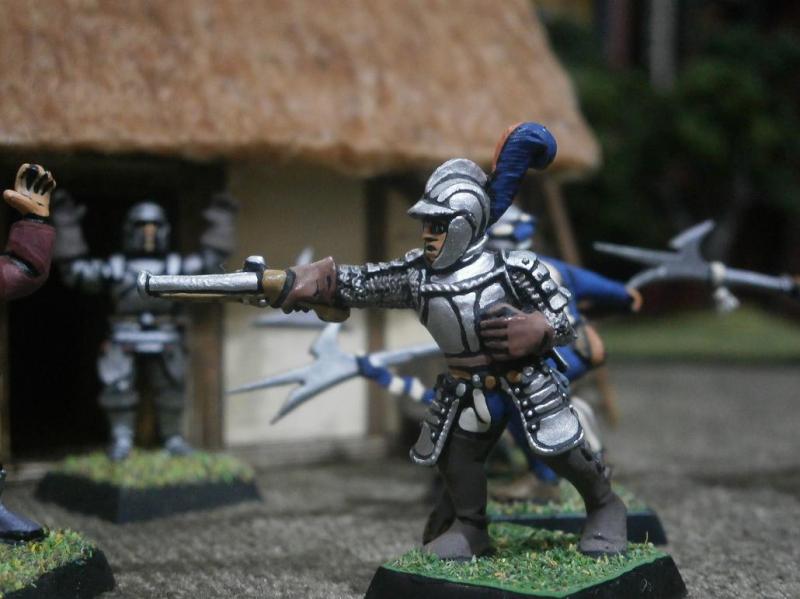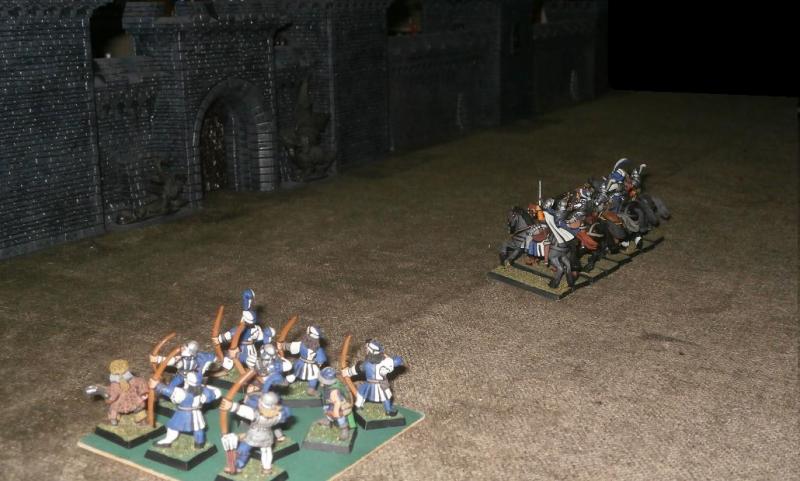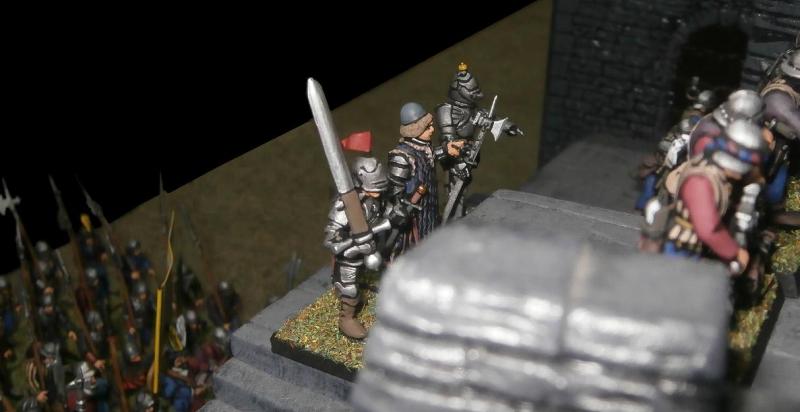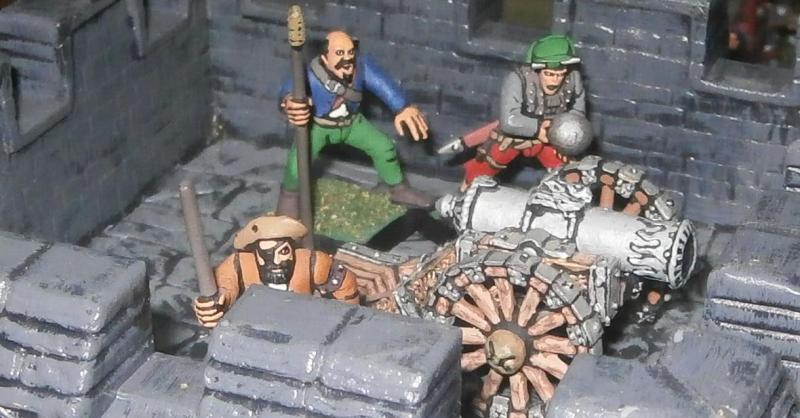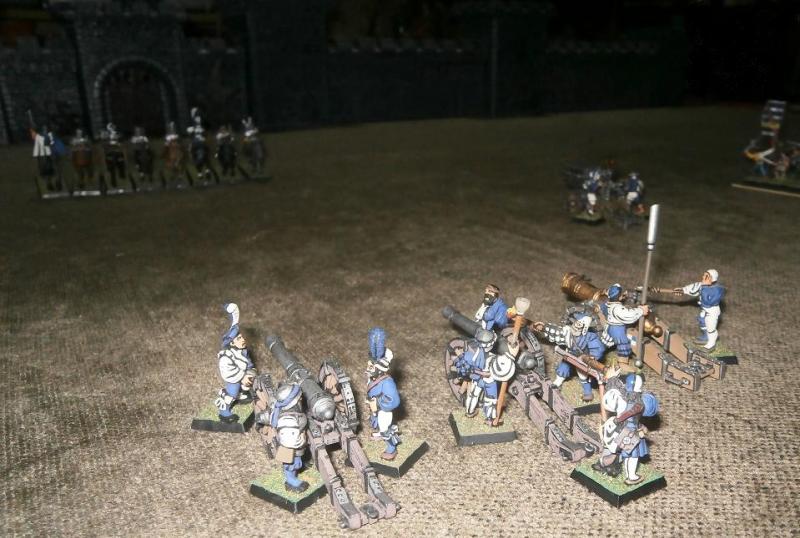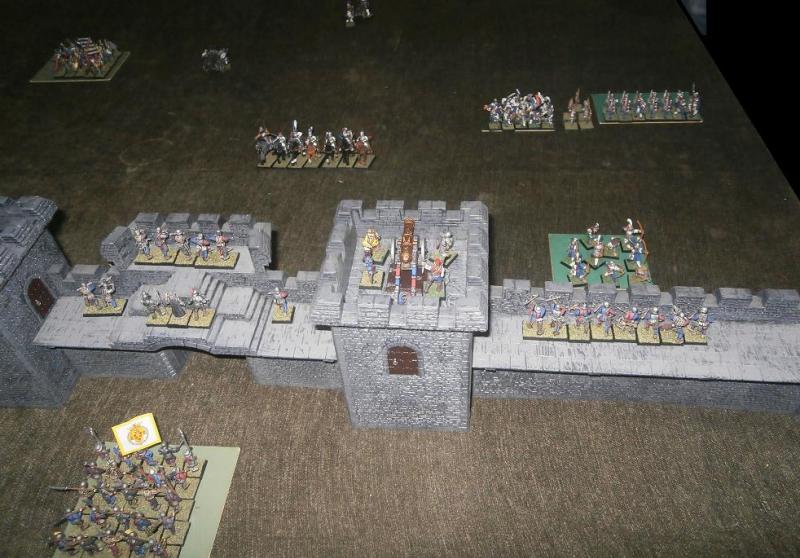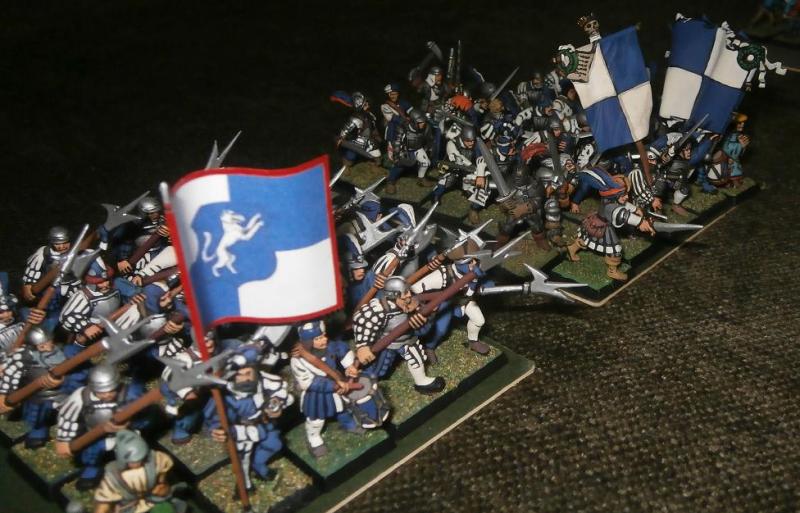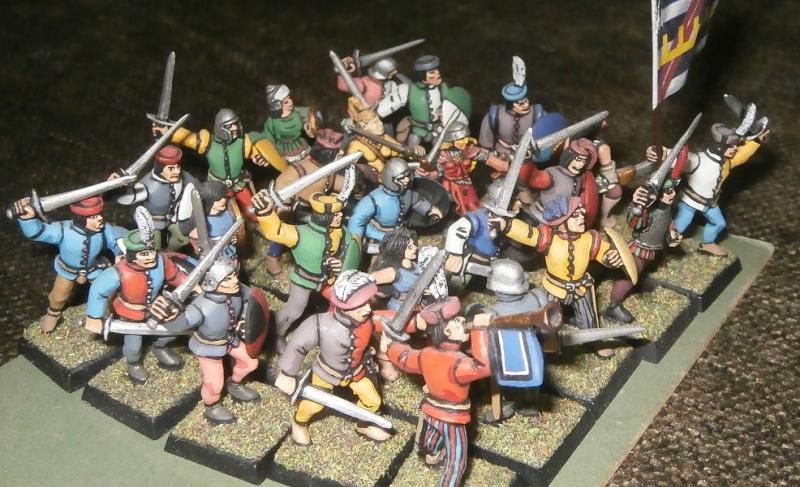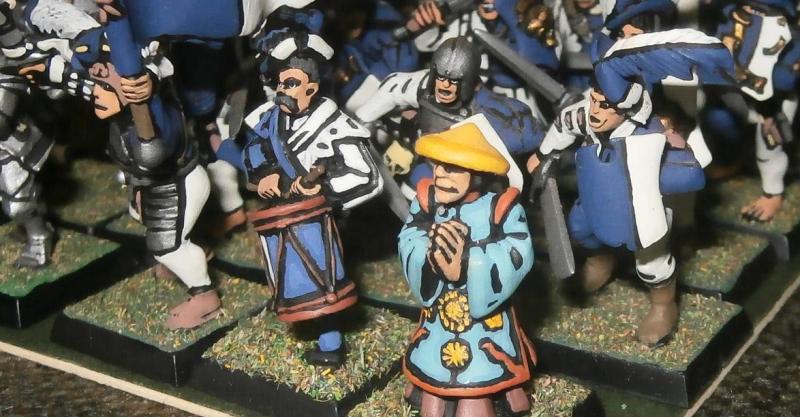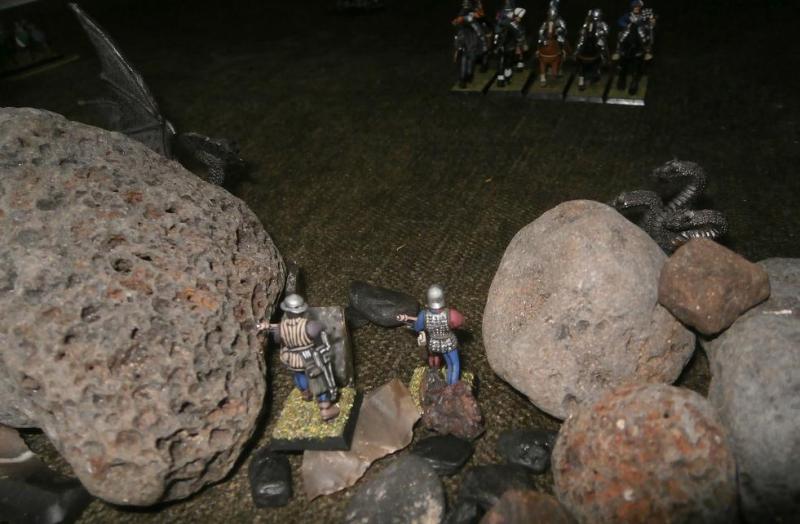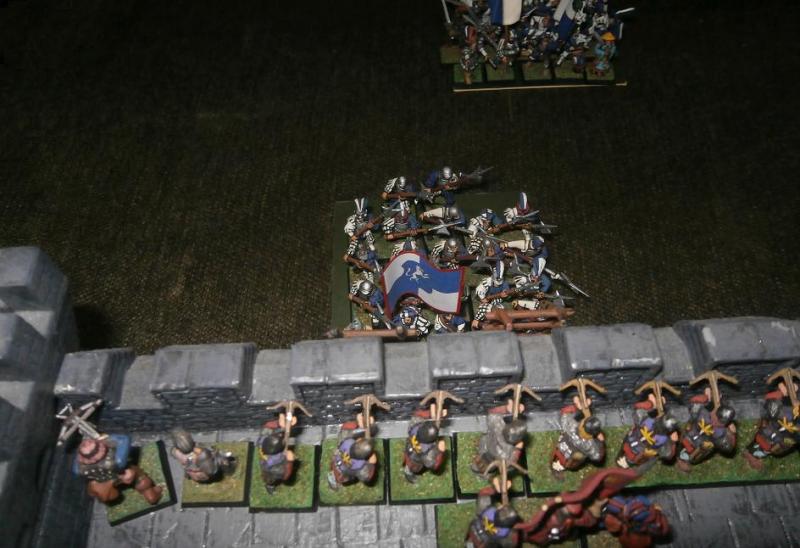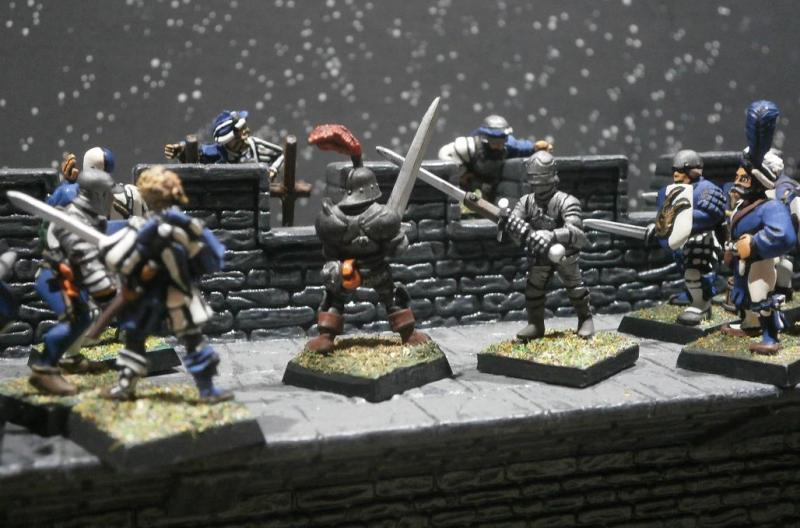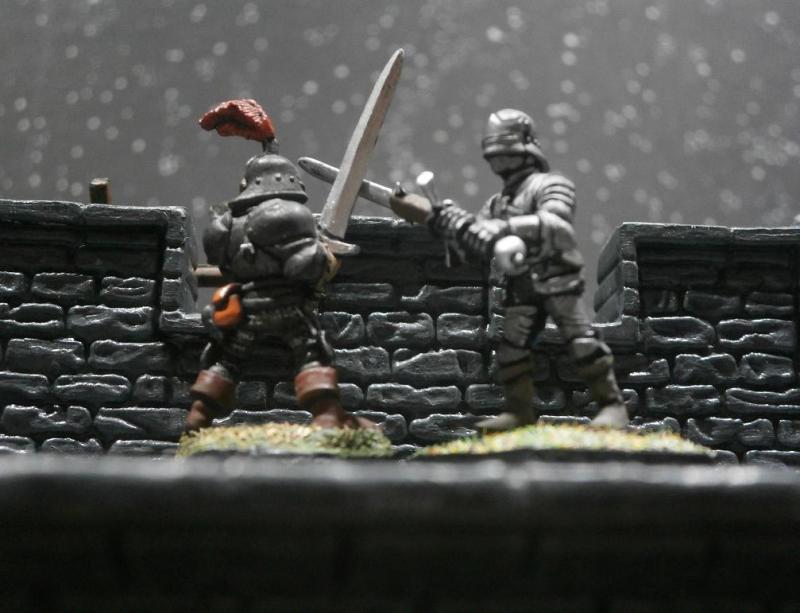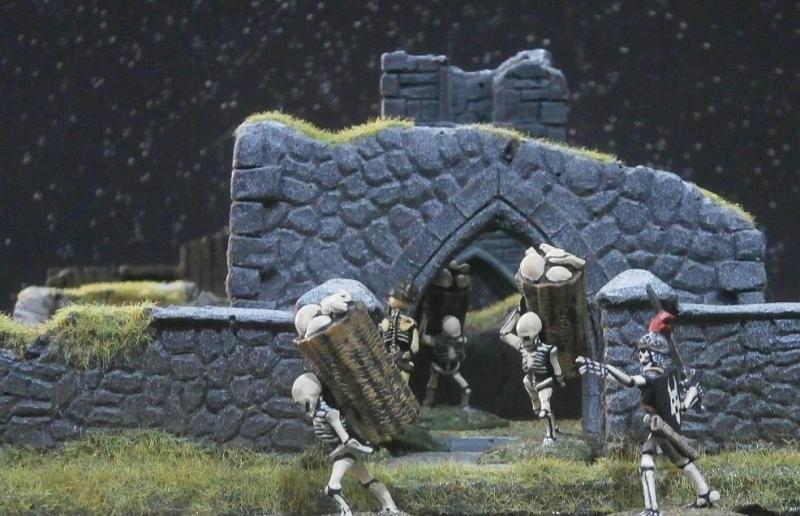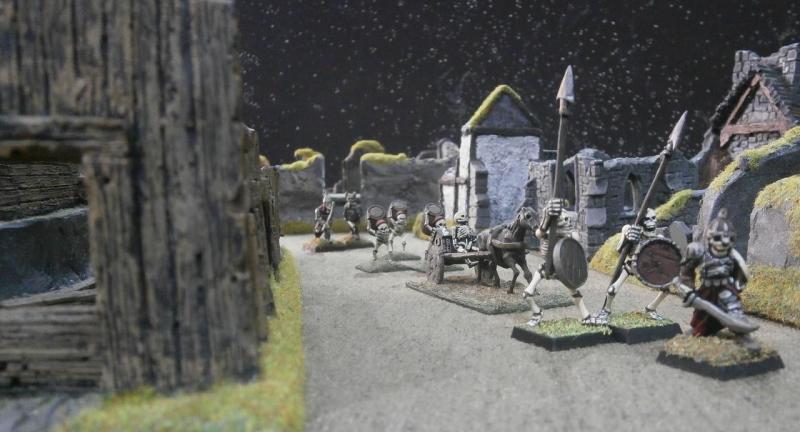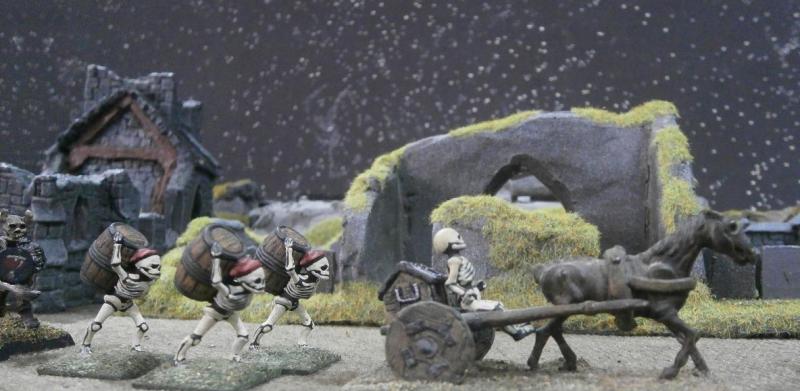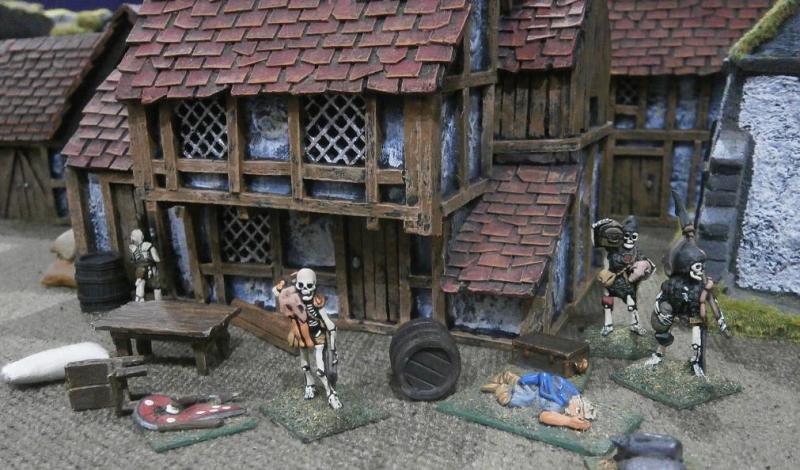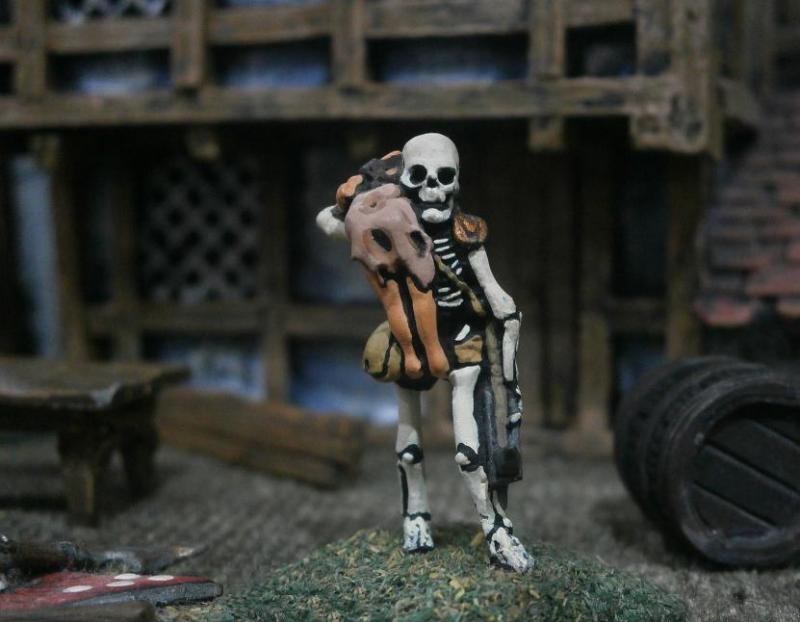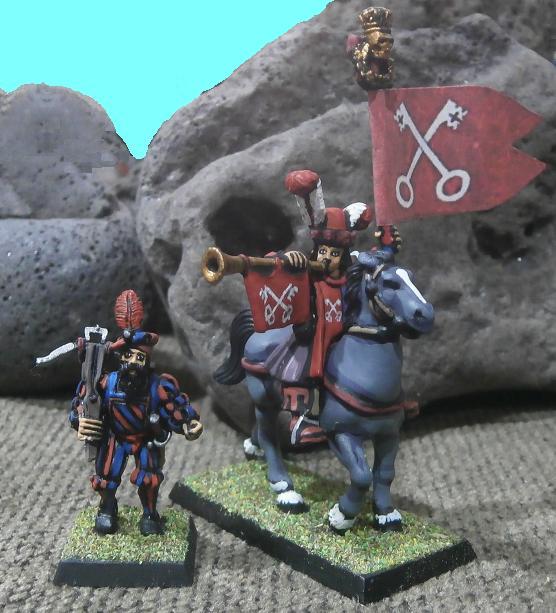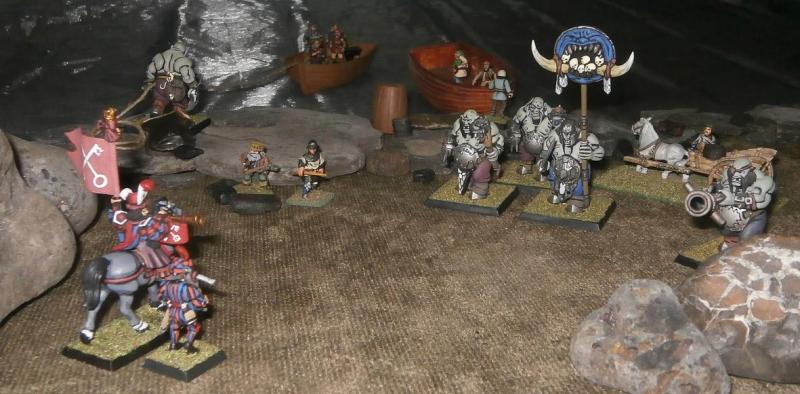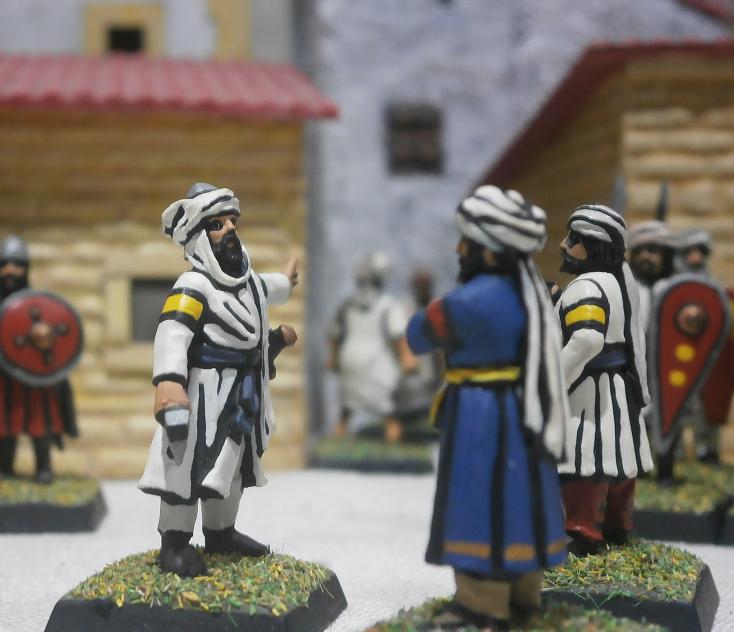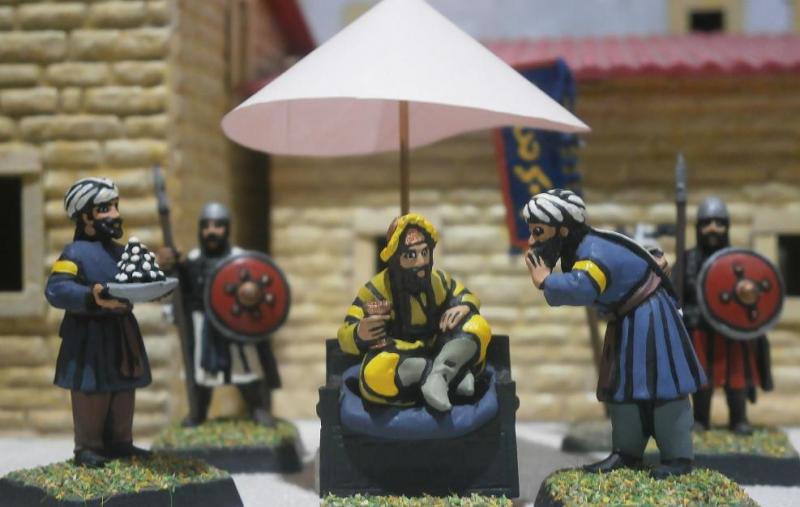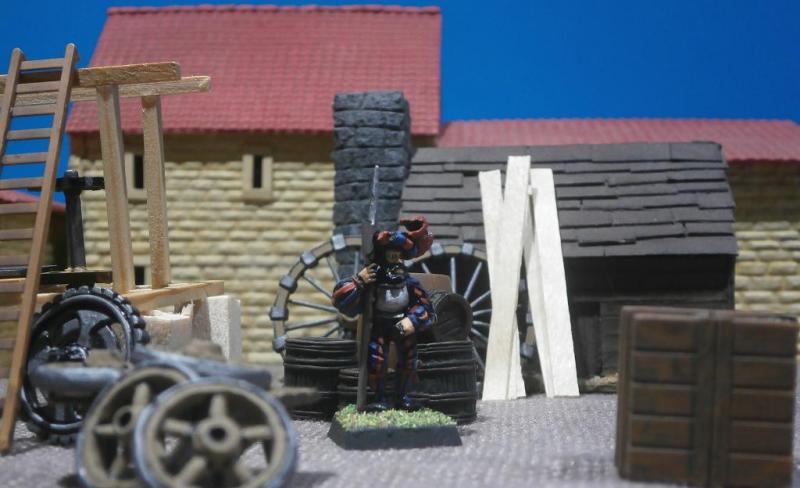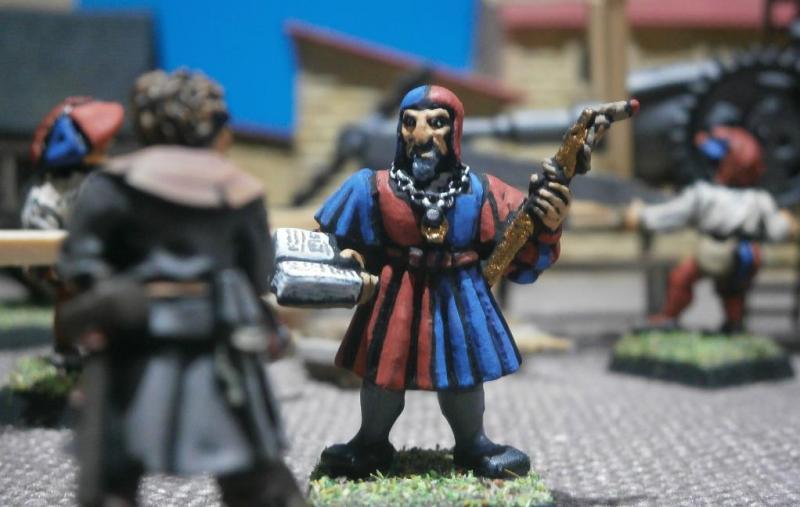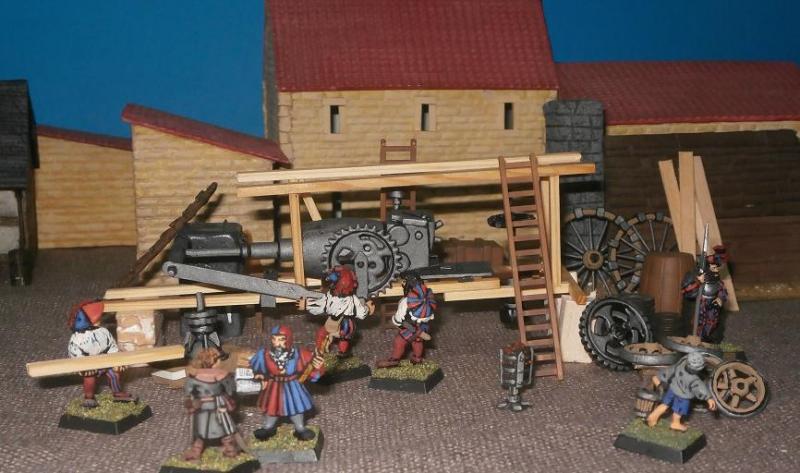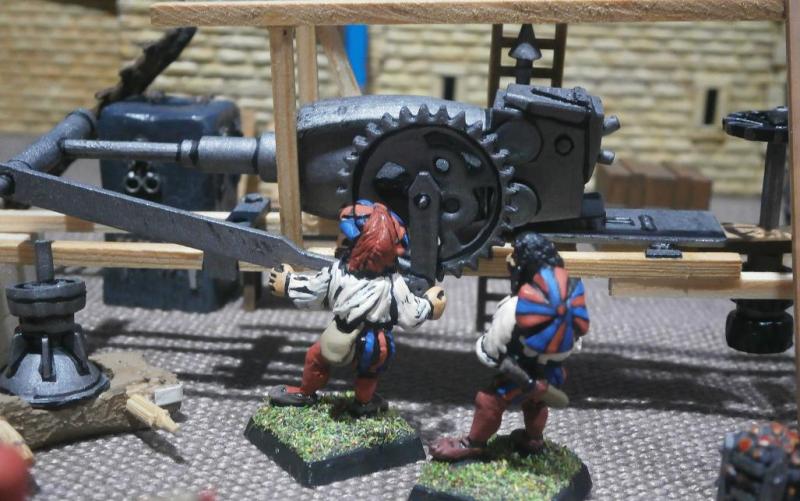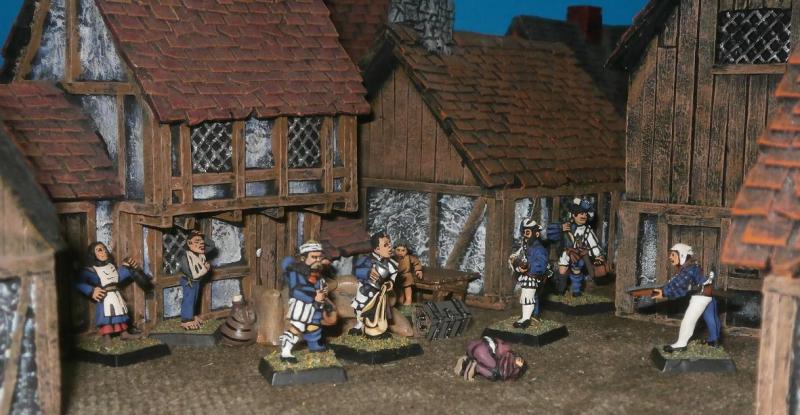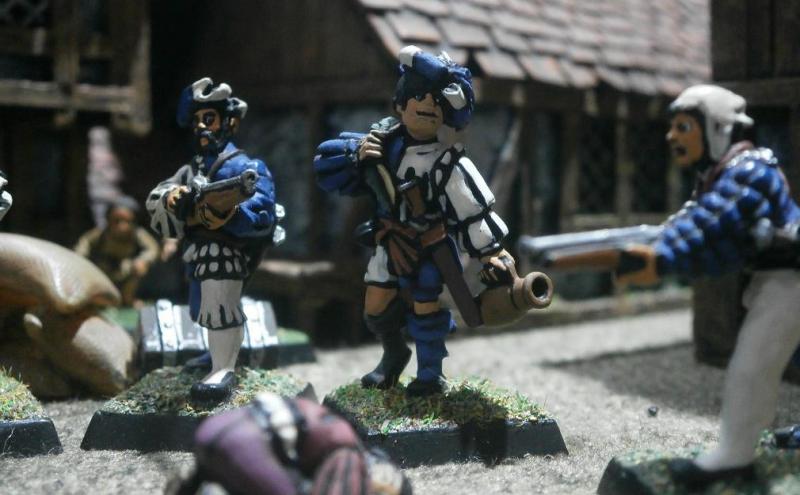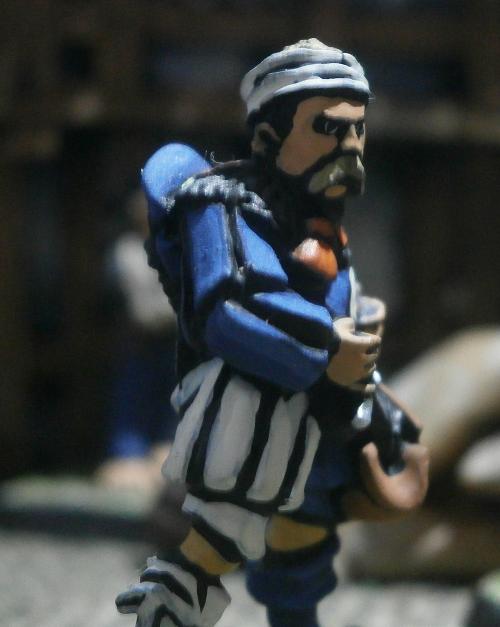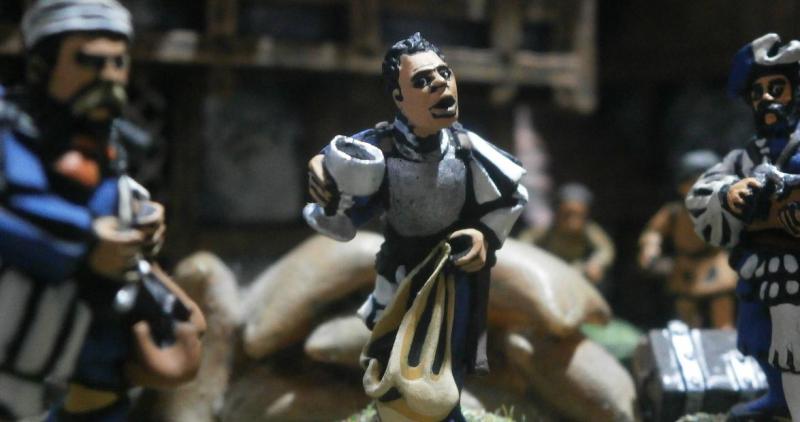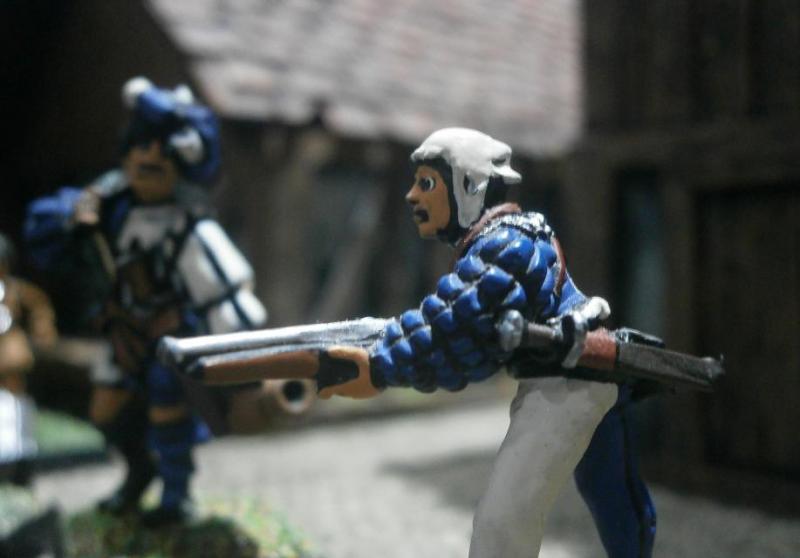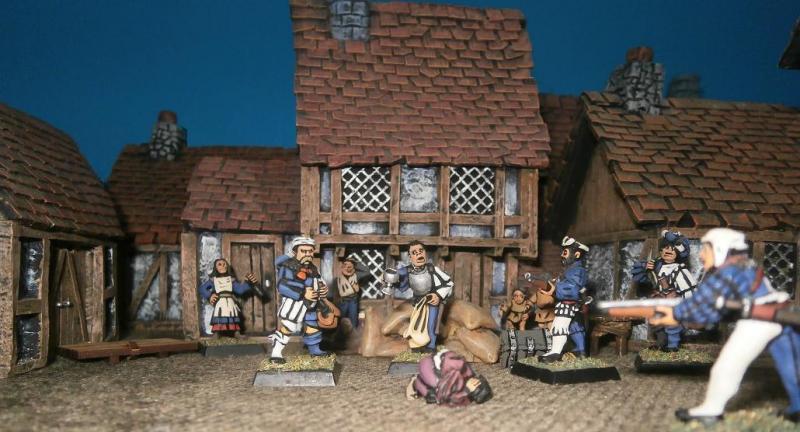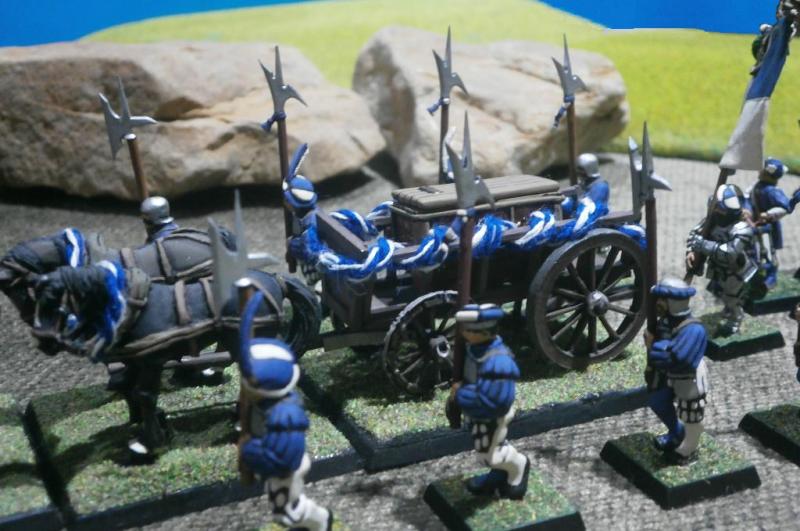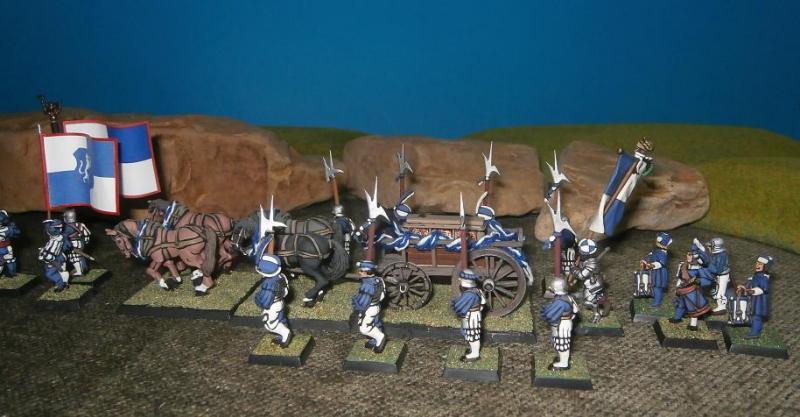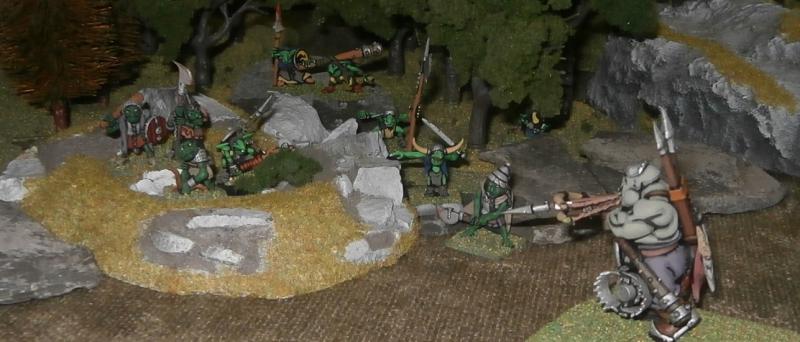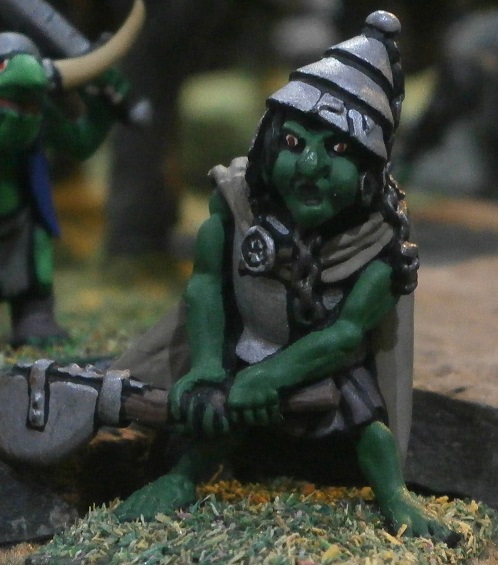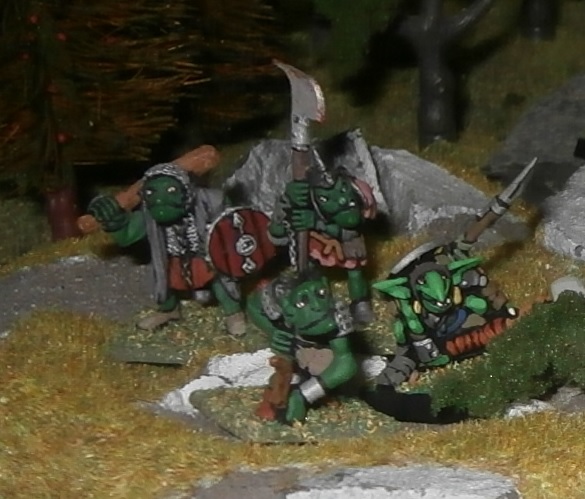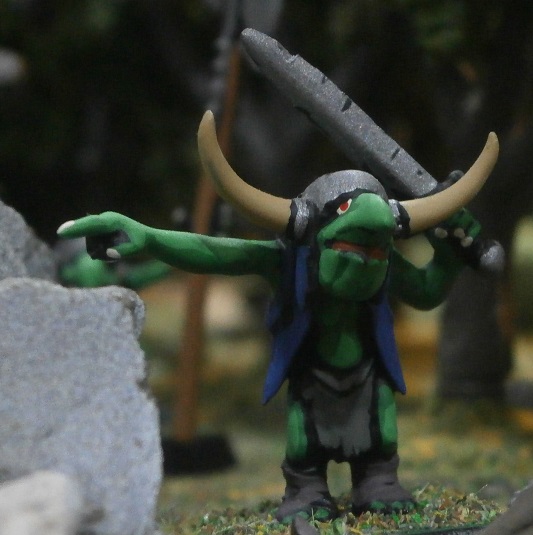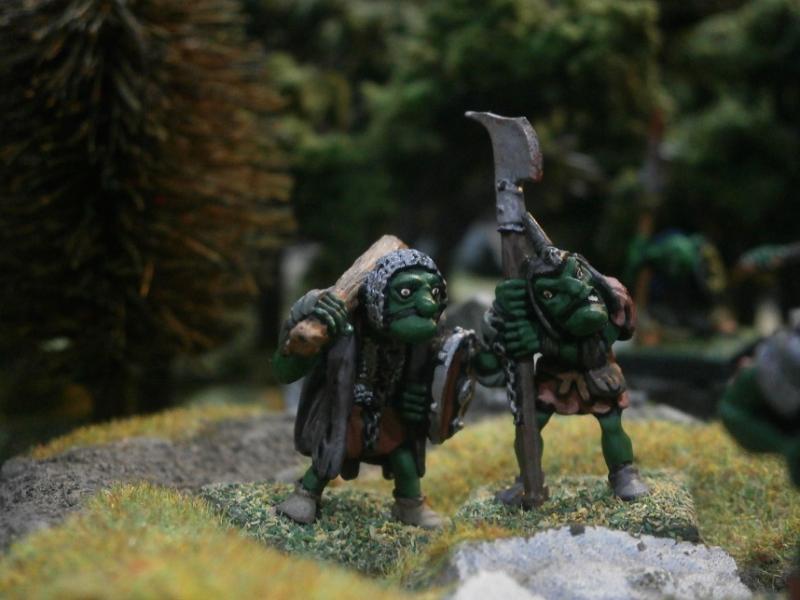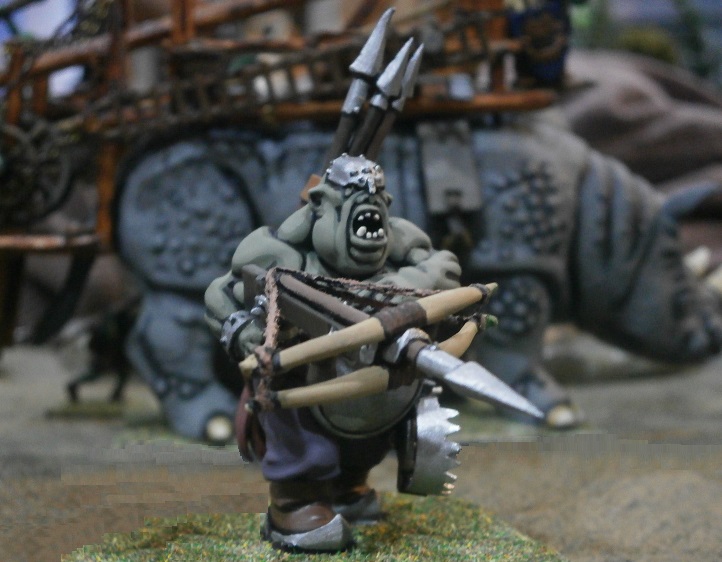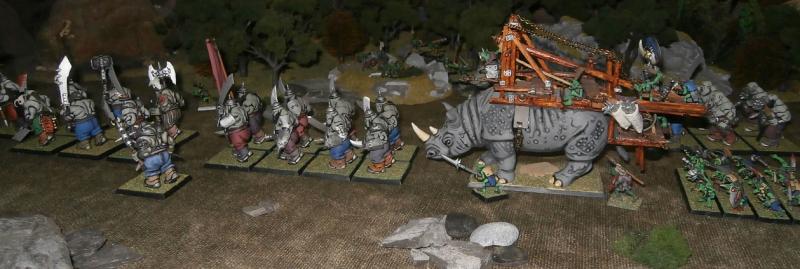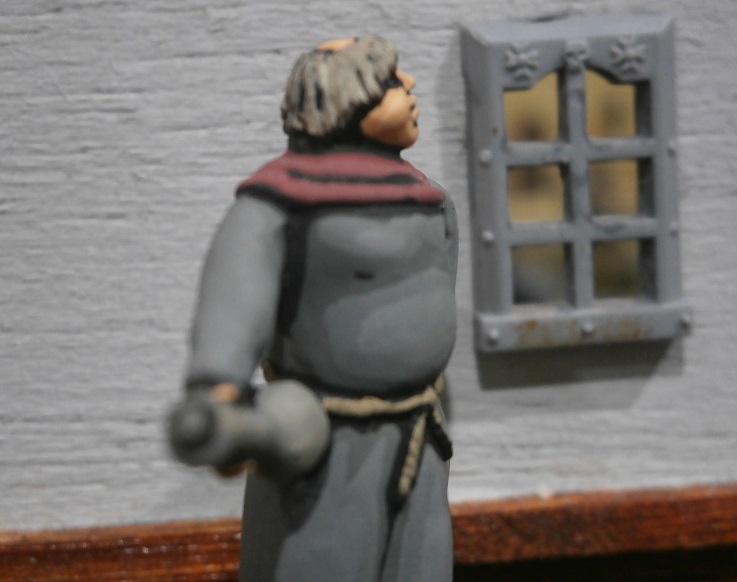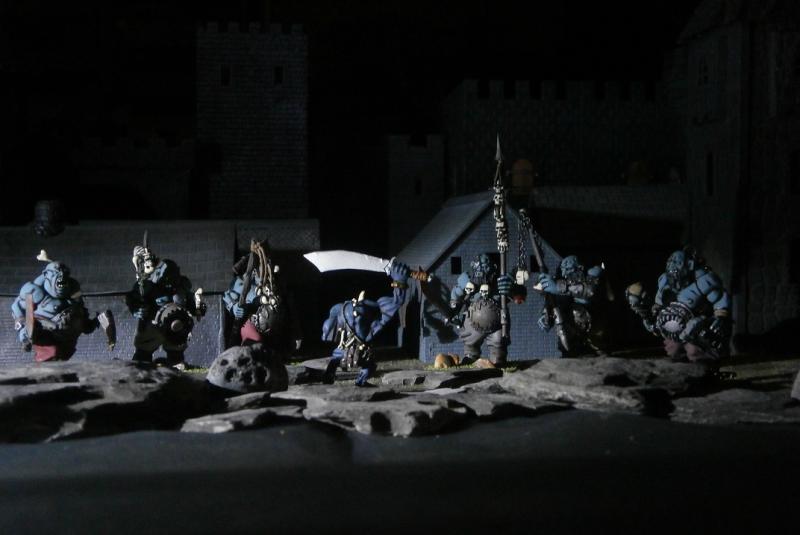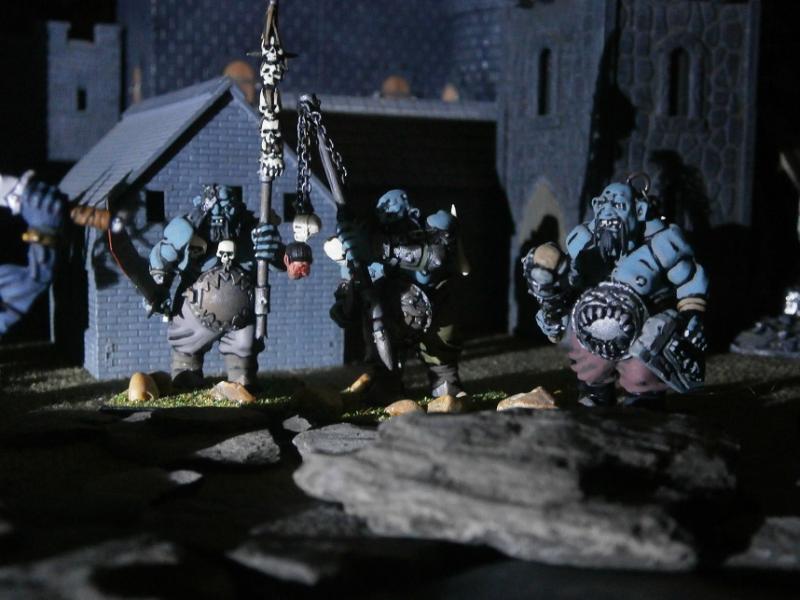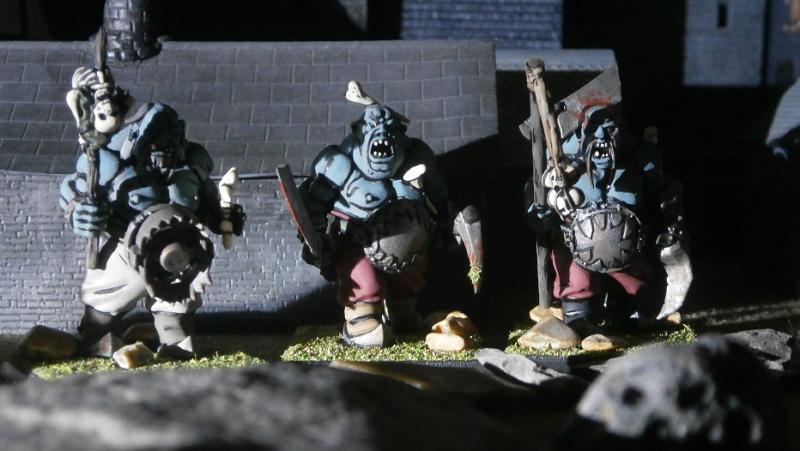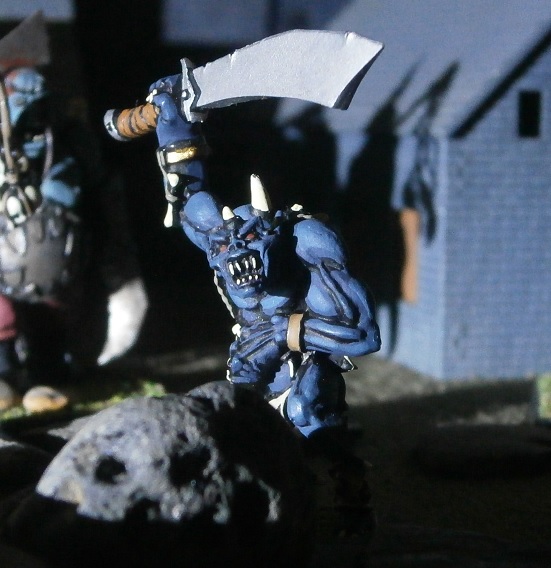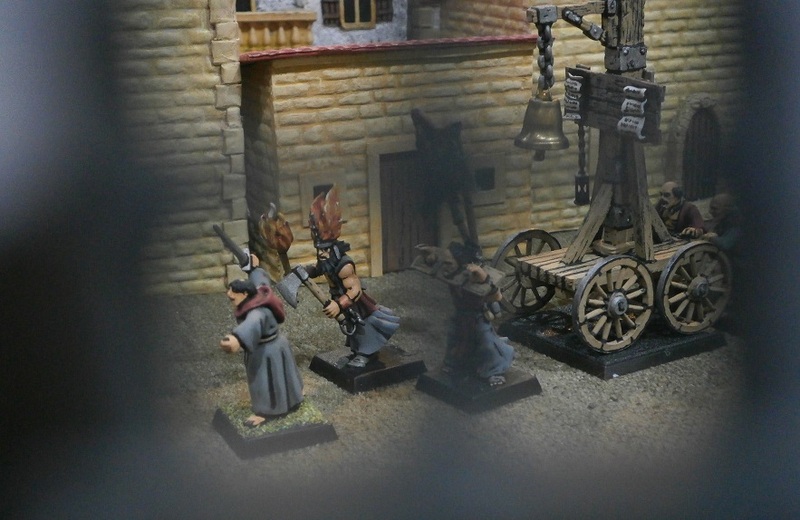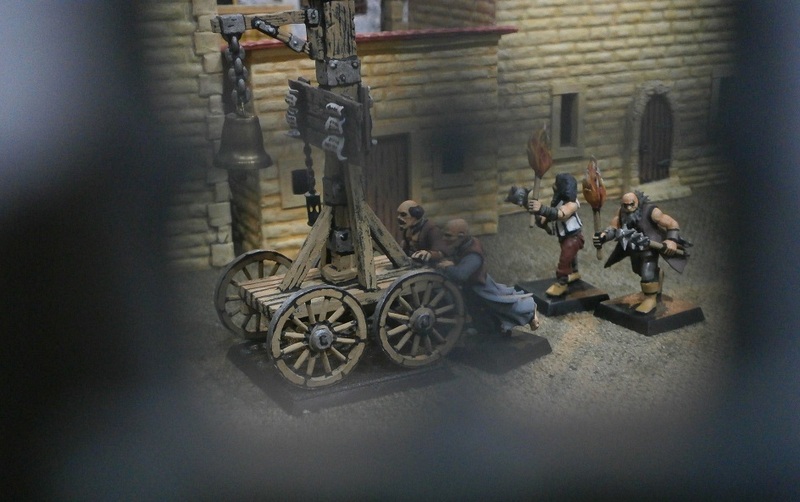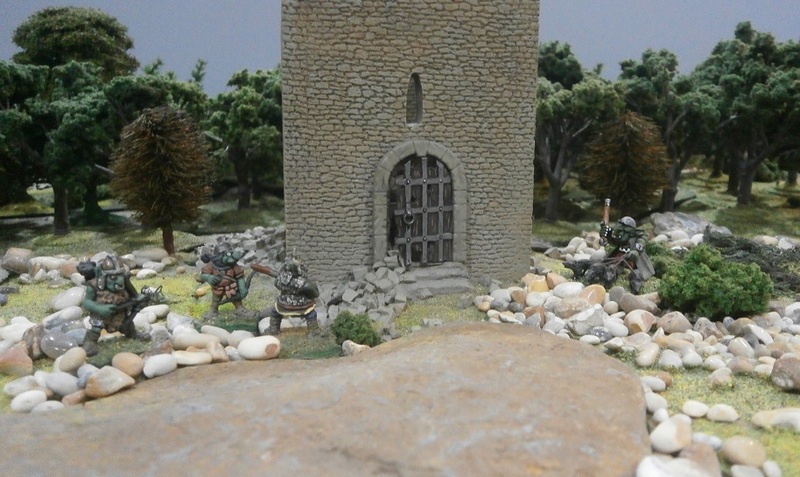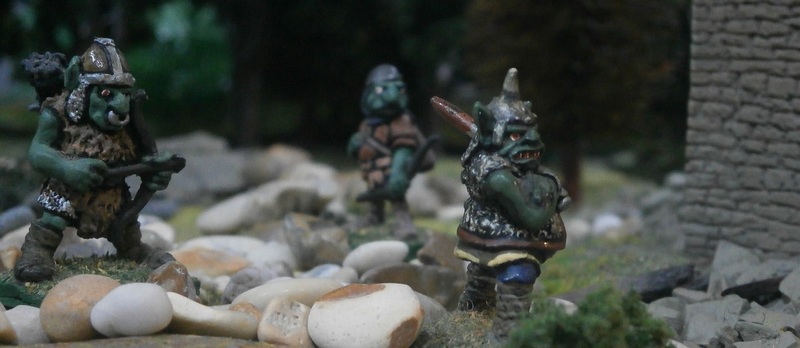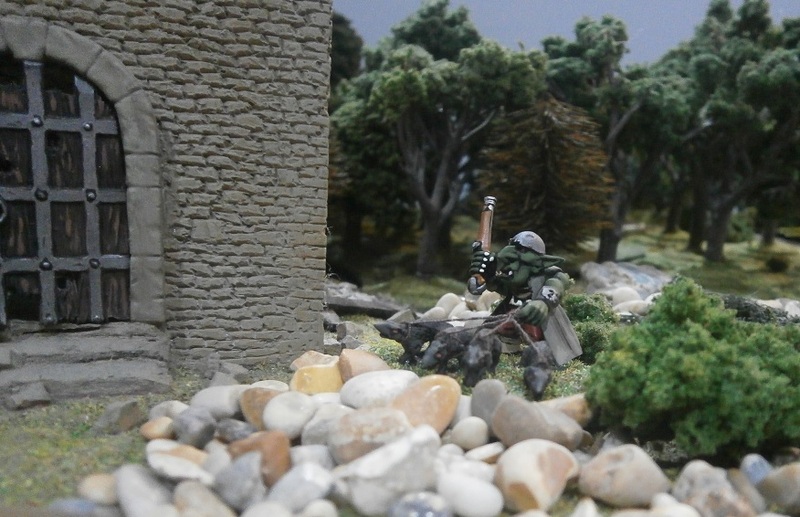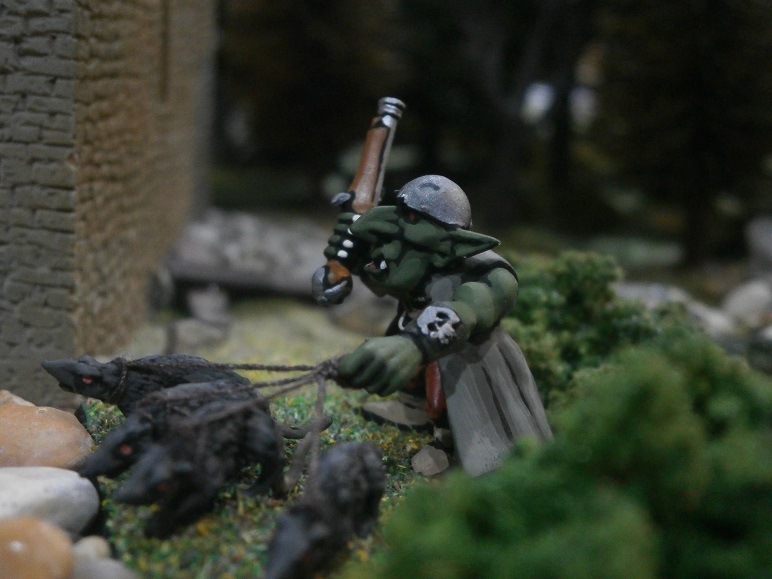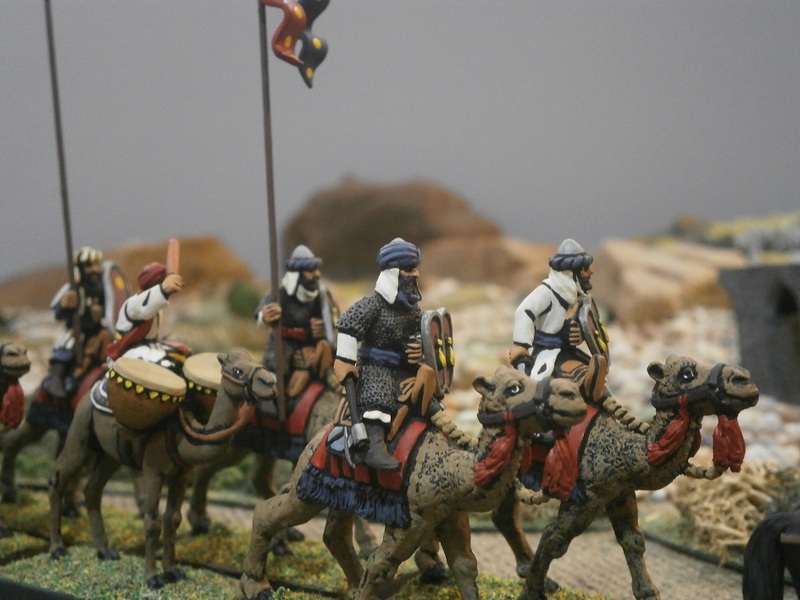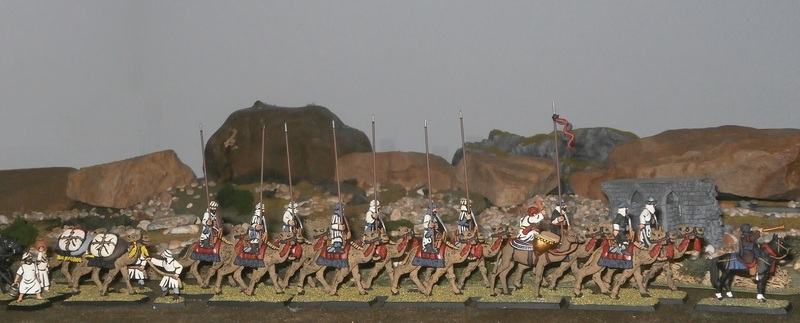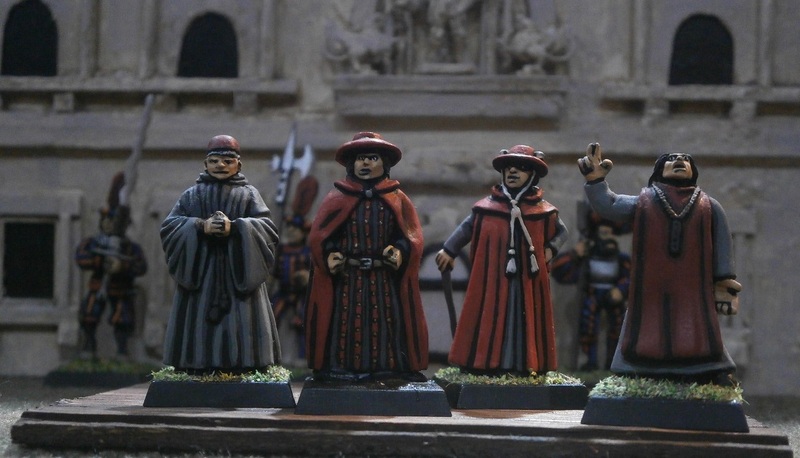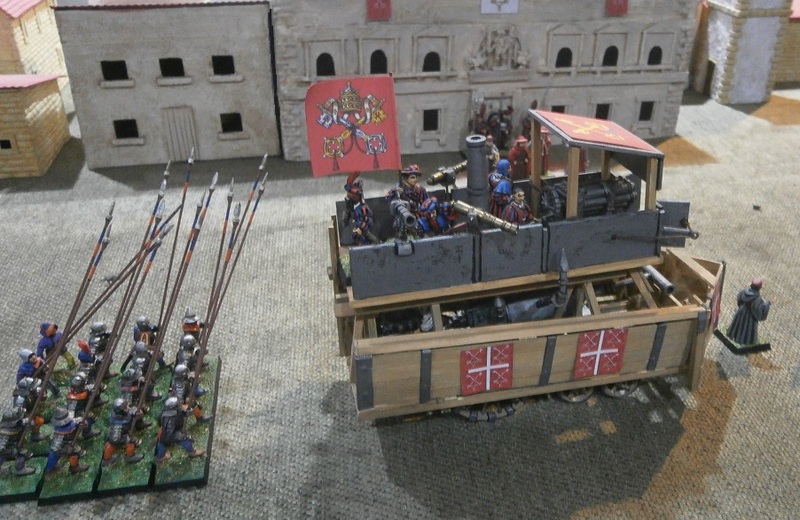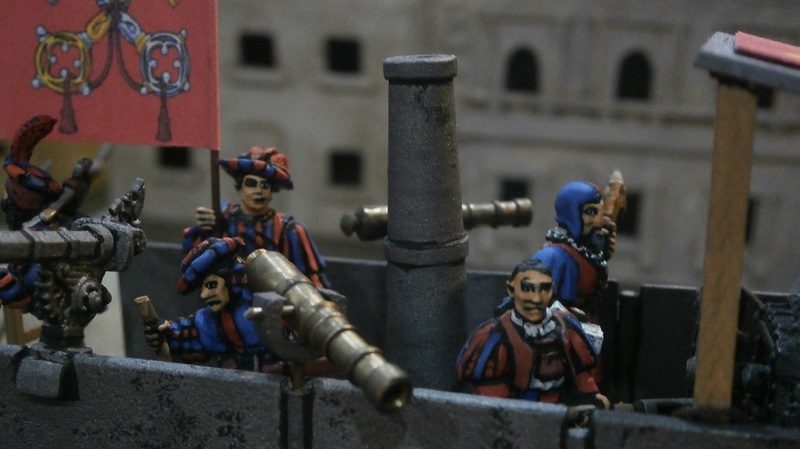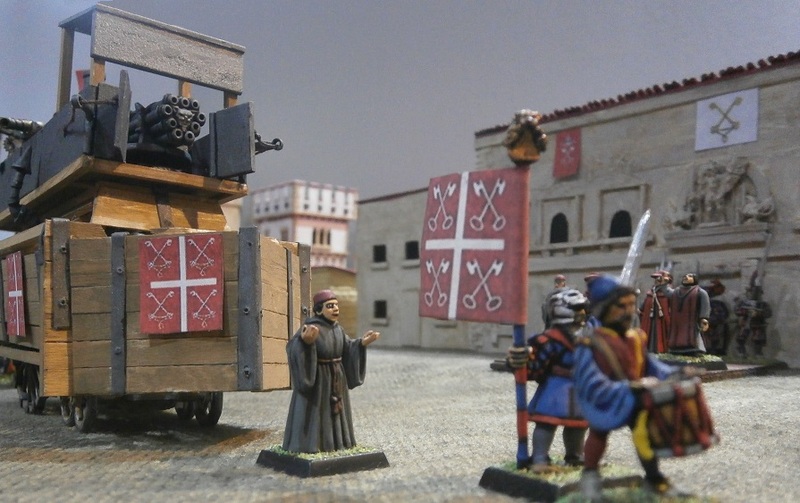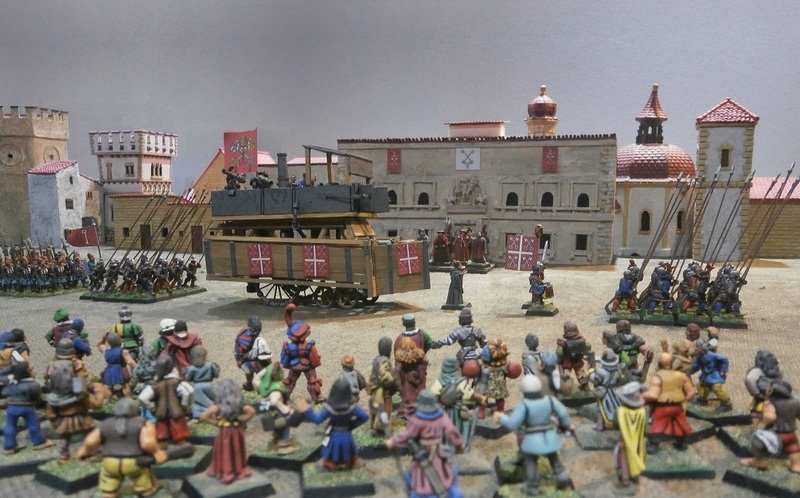Early 2402
5. Gladius Morri super terram cito et velociter (The sword of Morr, striking and swift)
A square in Trantio
“What have you got there then?” bellowed Giovacchino as he swaggered unsteadily from the alley, still clutching the wine jug responsible for his current inebriation. His words boomed around the little square, where four more Pavonan soldiers stood around the kneeling and pathetically hunched form of a man in the livery of the Compagnia del Sole. Several Trantian bystanders watched from under the jettying beams of the square’s main attraction – an alehouse - as Giovacchino strode up to join his comrades. His stockings hung loose upon his calves while his hat tottered upon his head at so heavy an angle it was a wonder it was still attached.
“Got yourselves a prisoner, eh?” he asked. “Big deal. You should have gone down there with me for richer pickings. What I have here is worth its weight in silver.” He jangled the clattering contents of his sack to prove his point. “Because …" he paused momentarily for effect "... it is silver! What you’ve got is worth only its weight in dirt.”
A whimpering sound came from the prisoner, expressing either fear or helplessness or a potent combination of the two. Giovacchino smiled in a self-satisfied manner, rolling his eyes mockingly, too drunk to care how annoying he would appear.
“Shut it, Chino,” said Mariano, his own slurred voice sounding no less drunk. “He ain’t told us all we need to know yet. We don’t want you upsetting him all unnecessary.”
“Why?” said Giovacchino loudly. “What you after? Is it good stuff? Does he know where there’s more?”
“We can find that out later,” said Aldus – sombre and sober despite having drunk as much, if not more, than the two much louder soldiers. Although quiet, he was the sort of man who was always heard. His stern face suited him – for he did bloody work in battle (a 'soldier’s soldier' was what many called him) and always seemed to have his wits about him whether fighting or drinking. His present sobriety was all the more impressive considering the blood he had lost from the head wound received during the assault upon Trantio. The others were all now looking at him.
“Right now,” he said …
… “he needs to tell us where the rest of his friends are hiding.”
“It don’t look to me,” said Giovacchino, “like he’s in a conversational frame of mind."
“I can make him talk,” offered Carlo, prodding the squatting captive’s head with the muzzle of the handgun he had kept trained on him ever since they found him. “And if he don’t talk, then I can shoot him to teach his friends what happens when they don’t cooperate.”
The whimper was heard again, no different from the last time. Mariano raised his hand abruptly, spilling wine from the goblet he had forgotten he was holding. It was perhaps intended as a gesture to silence the others, but instead looked more like he was about to make a toast. He addressed the cowering man,
“We’re not going to have to shoot you, though, are we? Because you’re going to tell us where your friends are.”
“They’ll be coming out either way,” added Carlo, “whether you’re alive or not. For you, its better they come out now.”
This time the whimper had words wound into it. “Just me … There’s just me.”
Then a woman’s voice was heard, and everyone turned in surprise - more wine being spilled as a consequence. It was a serving wench who had been watching from the start, and who had, until the captive was discovered, been busy fetching Mariano’s wine. “It’s true. He’s on his own. Him and two others were hiding in the old cellar, maybe since the fall. We didn’t know anyone was there until last night, when his friends ran out. My master told the watch, who went to tell whoever the watch tell. They’d been a-drinking down there, drowning their sorrows on foul beer too long in the cask. He got left behind and we only found him this morning. Don’t think he could get up the ladder.”
“If that’s so, then he’s no use to us,” declared Carlo. He blew upon the burning coals at the end of his slow-match and opened his pan. “May as well …”
“Wait!” Aldus snapped. “You’re not shooting him. He’s not our enemy. Not any more.”
Carlo snorted cruelly. “Why? Just because he’s cowering there unarmed and afraid? You know what the Compagnia del Sole have done – you’ve got a new scar to make sure you never forget. I never thought you such a compassionate soul, Aldus!”
Aldus showed no sign of offence at Carlo’s words, speaking with only his usual seriousness, and the ever present hint of potential threat.
“Because the Duke has offered employment to the last of the Compagnia del Sole," Aldus said. "Now that his realm has swelled to such a great size he needs soldiers. And that …” he gestured towards the prone captive, “... despite appearances, is a soldier.”
Mariano snorted a laugh. “Of a sort. I say kill him. You haven’t heard what his kind have done? How they killed a priest to rob him of his beads and robes, the better to disguise themselves.”
“I heard,” said Carlo gravely. “We're the army of Morr the Supreme. We've won victory after victory in his name, being both favoured and blessed and obviously so. While this man’s fellows, defeated in battle by Morr’s own will, chose to deny his judgement and kill Morr’s priests in petty revenge.”
Giovacchino, having drained the last drop of wine from his jug, wiped the back of his hand across his lips and frowned. “Mariano, what in Morr’s name are you talking about? What priest?”
“The arch-lector didn’t just send a priest to Duke Guidobaldo to beg him to end the war against Trantio because of the vampires in the north,” said Mariano, “but sent another to ask the same of the tyrant Prince Girenzo. The second priest arrived a bit late, though, didn’t he? What with Prince Girenzo being dead. Still, can’t complain as it was a happy ending after all, the war being ended already.”
“So what did the second priest do?” asked Giavacchino, growing frustrated.
Mariano rolled his eyes. “You don’t listen do you, Chino? I already told you – he got himself killed on his way back to Remas by Compagnia scum like him. Brave men, eh? Killing a priest and his servants with no soldiers to guard them. Still, they got their comeuppance, ‘cos some of our boys found them prancing about in priestly robes and killed every one of them. True judgement and justice, I say. Swift and summary too.”
Carlo nodded. “By Morr’s justice it was done, for we are his hand. Well, it so happens Morr is holding a handgun right now.” Once again he blew on the coals to clear the ash and make the saltpetred match fizzle with heat.
“Give rest to your piece,” ordered Aldus, who as corporal had every right so to command. “We serve Duke Guidobaldo first, while his grace answers to Morr. We’re the Duke’s soldiers, not his magistrates. And if you like then yes, we’re Morr’s holy warriors too. Doesn’t make us his inquisitors, though. Tell your stories round the camp fires as you wish, and believe them too for all I care. But never forget that we are sworn to obey, and that’s what we will do. We have orders. Now, pick him up, tie his hands, and let’s go.”
...
Il reggimento e il governo della citta di Trantio (The rule and government of the city of Trantio)
A Proclamation to be Read to all those who Dwell in the Villages of Preto and the Town of Scorccio
By Order of His Grace Duke Guidobaldo, Ruler of Pavona, Trantio, Astiano, Most Obedient Servant of Morr the Supreme
I rule Trantio by right of conquest. The palace is mine. The city is mine. I command all forces remaining in the realm, and all officers bow to me and obey my commands and mine alone. You have thus become my subjects, just as you were subjects of the tyrant I have defeated. Fear me in the way all lesser folk should respect their master, but do not be too fearful, for I would have you know that you will be kept safe from the threat in the north under my rule, as long as you obey my laws and my commands. I can and will defend this my realm from all outside evil.
If, however, you resist, deny or in any way hinder or refuse any part of my lawful, rightful authority, then I shall burn unto the ground your homes and fields, and leave you starving and homeless to face the evils that this way come. Alone and weak, helpless before the foe, you will surely perish at their hands. And this will be right and just, for you will have the mark of traitors upon you, and furthermore you will have refused the protection of the supreme god Morr.
Be not sad, however, nor let angry pride rule your hearts, for all this is only temporary. Indeed, rejoice, for my rule is merely a brief necessity. By my own son’s sacrifice the tyrant Prince Girenzo is defeated and slain, and to honour my son’s memory, as well as the fair traditions of the realm of Trantio, I intend to settle the rule of law upon this realm, and then promise to revive the glorious republic of old. It is not the way of things in my own realm of Trantio, for there I rule by my noble blood and hereditary right, but here in Trantio I accept the precedent of history and thus the right of Trantians to govern themselves, to debate in their committees, to vote in the councils, and so to create their own laws and decide their own fate.
Yet this cannot be done immediately, for first the corruption of the tyrant prince must be washed from Trantio. Once this is achieved, I shall leave the reins of power in the hands of a lawfully elected council. Furthermore, I shall ease the transition by having my own surviving son, Lord Silvano, serve as first Gonfaloniere of Trantio, to chair the ruling council and command the realm’s military forces. This may seem to go against historical precedent, for the office of gonfaloniere has usually been an elected one, but it is intended as simply a temporary means to ensure the safe transfer of power and steady establishment of a new republic, as well as my continued support and alliance until all is well again in Tilea and Trantio. The realm of Trantio must be defended against the terrible forces marching from the north, and what better and more certain way is there to do so than to forge a strong, even unbreakable, alliance between the realm of Trantio and Pavona, by having the love of father and son bond the two together.
So it is that I have the welfare of Trantio wholly in mind. Woe betide any and all who think to thwart these my plans, either to stir rebellion or fail to do all they can to support the cause of Trantio’s defence. Any who do will feel the full weight of my wrath.
Furthermore I have taken steps to ensure the care of your souls, elevating the priest Father Erkhart to the clerical office of Lector of Viadaza, so that all within the Viadazan diocese can rest assured that the church will be in safe and holy hands whilst facing the direct threat of the necromancy of vampires.
These things are being done in the name of the mighty and supreme god of gods, Morr. Praise him, thank him, and obey his servants as they work to make Tilea blessed in his eyes.
...
The Beating of Solemn Drums
The western spur of the Trantine Hills
Lord Polcario Gondi, heir to the Duchy of Pavona, was dead. He died a hero, in single combat against no less a foe than a prince, whom he slew even as he himself was slain, thereby gaining the final victory for Pavona in its war of vengeance against Trantio.
Duke Guidobaldo ordered that his son would not be buried in Trantio, but in the Gondi family tomb in Pavona. Considering the rise of the undead in the north, great care was taken to ensure not only that Lord Polcario’s body was carried thence with dignity, but was guarded well, to prevent any attempt by the agents of vampires to steal it and use it for their own foul purposes. The column included several ensigns, each from regiments once commanded by the young lord. Eight drummers marched too, four before the coffin and four behind, beating a funerary march most sombre and solemn, while a single flute added a plaintive bird-song sound of singularly sad beauty.
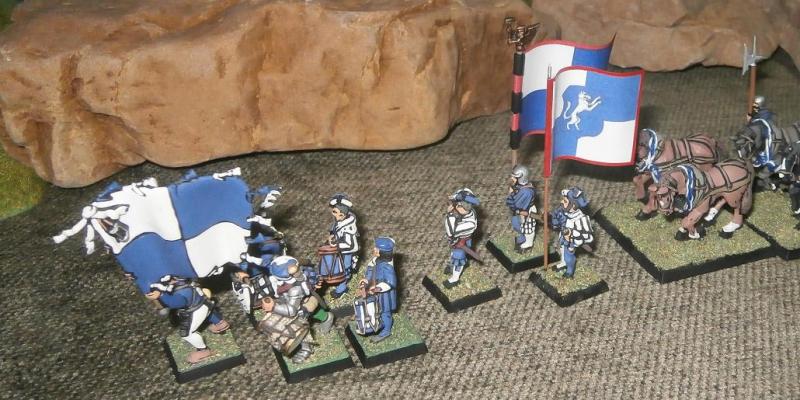
The carriage upon which the coffin was lain was decorated with the blue and white of Pavona, and so too were the draught horses pulling it. Eight of the best halberdiers Pavona had to offer marched at its sides, while Lord Polcario’s own personal standard followed behind - unlike in life when it would go before him - sloped in the traditional manner of mourning.
Slowly but surely, the creaking of the wheels conjoined with the sorrowful sound of drums and flute, the little convoy made its way south towards the Via Aurelia, upon which Lord Polcario would travel the last stretch of this his final journey through the mortal realm of Tilea.



